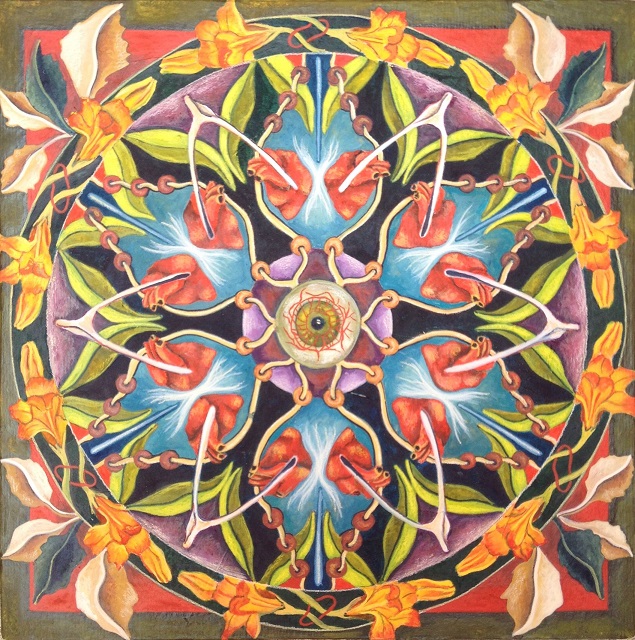
My horoscope this morning suggested that there are two kinds of people in the world: argument makers and beauty makers, and encouraged me, of course, to be and surround myself with the latter.
I must admit that I love the sound of that—beauty makers.
How would one describe a maker of beauty? Is this something we can actually put our finger on? Since I am an artist, I like to think that I create beauty. Creating beauty does not necessarily have to fall under the domain of art though. Beauty can also be created with food or with gestures or even ways of being.
But since we all have different ideas of what is beautiful, it could be argued that in the end everything is beautiful—even the argument makers.
Buddhists believe that there is no inseparable concept of good or bad, no ugly or beautiful. Shakespeare decreed, “There is nothing either good or bad, but thinking makes it so.” I have tried to apply this concept (often desperately) in my life for many years. To see the beauty in everything—the soul-enhancing and soul-sucking alike.
The soul-enhancing is easy. It is simple to see beauty when we are standing in front of a dark, expansive ocean on a moonlit night, or embracing a small child gifting us with a dandelion bouquet. But how about when we don’t get the thing that we want, when someone’s actions hurt us or we are visited by crushing grief?
If “beauty is truth,” according to John Keats, then it follows that beauty is what is. How simple is that? What was and what will be contain something beautiful, but that is only memory or projection. It would seem that in order to see beauty, you must experience it, and this can only be truly done in the present moment. I have written many poems about past beautiful moments in my life, but it now occurs to me that the beauty suggested by those moments is contained in the reading of the poem, perhaps in the cadence, expression or emotion of the reader, and their connection to the words, and not necessarily in my remembered experience.
When we start (or create) an argument—be it with a friend, a lover or the taxi driver—we are like minnows swimming against the tide, because an argument is nothing more than resistance to what is. An argument presumes that we are trying to change something in that moment. We are trying to change a mind, or a circumstance or our luck into something else, something that we think we want or will make us feel “better.”
Arguments, by their very nature, cause us to resist what is. We all know what resistance feels like viscerally. Our bodies become tense and our minds become flooded as we chew over the same thoughts again and again, as if more thinking will somehow change what has already occurred. We do something impulsive or irrational, or conversely, find ourselves paralyzed, unable to make decisions. This is our body’s resistance to change and acceptance, essentially creating a stand-off between what we want and what is actually happening—an obstacle sure to create suffering.
If what we want is only our narrow version of beauty, we are condemning ourselves to experience only half of life, not to mention, a fair amount of gut-wrenching.
Perhaps we think we can stave off the agitators. Does it always follow that beauty attracts beauty? I like to think that is true, although in my own life, as much as I try to follow and be the beauty, the argument “frogs” still rear their warted heads, causing that familiar resistance. None of us want to invite argument-makers to have a seat at our table, at least not willingly, but they sit down nevertheless. I’m always surprised when I feel that resistance, because I like to think of myself as someone who sees the beauty in the warts—wabi sabi and all that. When it inevitably happens, I practice not even trying to separate beauty from agitation.
Maybe we simply need to shift our perception of argument. If we can’t avoid engaging or being the argument makers, it is possible to transform them and ourselves and see the argument in a different light. True beauty can be thought of as a moment of teaching, a moment of realization or connection, but sometimes it shows up disguised as a demon trouble maker. We just need to understand how to leverage it to our advantage.
As much as we all seek it, perhaps true beauty scares us more than we imagine, and when the blinding light of someone or something is surrounding us, we suddenly can’t believe that we are worthy of this brilliance. We then choose to argue with this light until it leaves us to shine on someone else. So, it would seem that in order to be present in our lives, we should cease arguing with the light, with this moment, with what is (be it “good” or “bad”) and decide that in the end, all beauty and all argument are equal and each contain a kernel of truth—something to guide us on our path.
Maybe then we can relax into our daily dilemmas and, as Shakespeare suggested, shift our thinking into radical acceptance. In this way, we then truly become our own beauty makers.
Author: Linda Laino
Image: Author’s own; Ayana T. Miller/Flickr
Editor: Nicole Cameron






Read 0 comments and reply